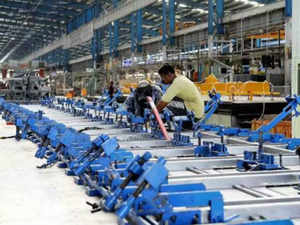
(Representative image)

COVID-19 CASES
WorldIndiaConfirmed4,067Deaths109Confirmed1,272,115Deaths69,374(This story originally appeared in

on Apr 06, 2020)NEW DELHI: A discussion has started within a section of the government over multiple ways to resume economic activity, particularly in manufacturing, in a limited way after the lockdown ends to enable businesses to pay salaries and meet operating costs and to ensure the economy does not fold up and go into a deep freeze.
While discussions are preliminary, and the outcome will depend on the coronavirus threat levels, there is loud thinking on allowing curtailed shifts with social distancing, allowing automated production like automobiles and putting in place a regimen of work passes and companies providing dedicated transport to their workers.
In case of automated production lines, it might be easier to commence operations given there are fewer number of hands on the floor and it is easier to observe social distancing. At the same time, it is essential to devise ways to get textiles and some of the other large employment generating sectors running to reduce likely economic hardship.
Measures are being considered even as thinking of the next economic package may await a fuller assessment of the domestic and international Covid-19 fallout. The immediate priority, of relief to the poor and tax compliance relief for individuals and businesses, has been addressed for now, it is felt.
Officials suggested that such factories will have to ensure that workplaces are not crammed, as it cannot be business as usual till the pandemic is brought under control. But arrangements can be worked out in such a way that 30-40% of the workers are allowed so that at least a part of the production cycle can commence. This will help keep supply chains, crucially in common consumer goods, moving.
This will also mean the movement of goods in some of the sectors although the demand for products such as automobiles may be limited. While there are suggestions that some of it can be stocked, for companies, carrying large inventories will impose additional financial burden.
There is a proposal to allow exporters, who have already received orders, to complete production and dispatch them to ensure that they fulfil their contractual obligation and are not barred from future contracts.
In fact, some businesses that have by and large agreed to pay salaries for March, will find it tough to keep meeting the wage cost going forward as their revenues have stopped. In fact, sectors such as tourism and hospitality are starting the month with zero business and sustaining operations without any sales is going to be tough. Even some of the largest companies in the consumer goods space are only running 15-20% of the production chain, which are part of the ‘essential goods’ set-up, industry sources said.
Besides, disruption in the supply chain for even food processing and beverage companies is holding up operations.
While big companies may be able to sustain their operations for a longer period, the smaller ones do not have deep pockets to sustain their operations without any revenue for long. The decision to bear the EPFO bill for those earning less than Rs 15,000 in units employing up to 100 workers is expected to cost Rs 20,000 crore annually, leaving the government with no headroom to bear the cost for the entire workforce.
Apart from workers, banks and other lenders also need to be paid to ensure that there is no pile-up of bad debt that impacts the stability of the financial sector in the medium to short term.
Source: indiatimes.com

